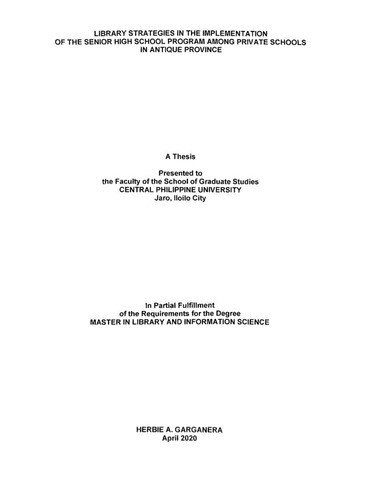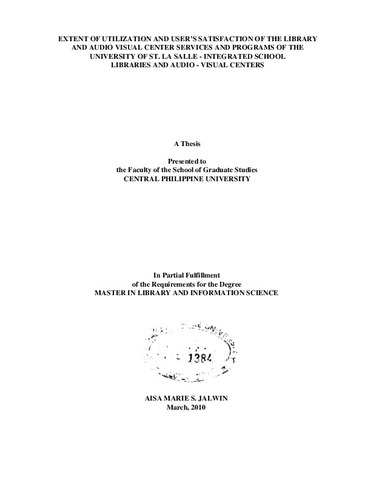Показать сокращенную информацию
Compliance with the Department of Education's standards for Philippine school library media centers among private secondary schools in Iloilo City
| dc.contributor.adviser | Billones, Federico S. | |
| dc.contributor.author | Diaday, Rosalie F. | |
| dc.coverage.spatial | Iloilo | en_US |
| dc.date.accessioned | 2021-03-12T01:50:18Z | |
| dc.date.available | 2021-03-12T01:50:18Z | |
| dc.date.issued | 2017 | |
| dc.identifier.citation | Diaday, R. F. (2017). Compliance with the Department of Education's standards for Philippine school library media centers among private secondary schools in Iloilo City (Unpublished Master's thesis). Central Philippine University, Jaro, Iloilo City. | en_US |
| dc.identifier.uri | https://hdl.handle.net/20.500.12852/599 | |
| dc.description | Abstract only. | en_US |
| dc.description.abstract | This descriptive correlational study was undertaken to determine the extent of compliance of 43 private secondary schools in Iloilo City with the standards for Philippine school library media centers as set by the Department of Education through DepEd Order No. 56 s. 2011. The extent of compliance with standards considered nine components of the library. A questionnaire was prepared based on the defined standards for Philippine Library Media Centers. The statistical tools used were frequency, percentage, means, Cramer’s V and Gamma coefficient. The findings showed that majority of the private secondary schools covered in the study were non-sectarian, not yet accredited, independent high schools, have been operating for less than 41 years and with an enrolment of less than 315 students. Most of the schools which have been in operation for a long time have complied to a great extent with the standards for: vision, mission, goals and objectives; administration; services and utilization. On the other hand, compliance with standards of human resource, collection management, physical facilities, information technology facilities and services, financial resources and linkages and networking among schools which have been in operation for only a short duration was to a limited extent. There was a strong relationship between years of operation and compliance with the standards for all eight component areas excluding human resource. Compliance with the standards for vision, mission, goals and objectives; administration; services and utilization, among schools with big enrolment was to a great extent. On the other hand, compliance with the standards for all nine component areas among schools with small enrolment was limited. There was a strong relationship between enrolment size and compliance with the standards for all eight component areas excluding linkages and networking. Compliance with the standards for administration; services and utilization and financial resources, was greater among sectarian schools than those among nonsectarian schools. Compliance with the standards of vision/mission goals and objectives; administration; services and utilization was greater among accredited schools than among non-accredited schools. There was a strong relationship between accreditation status of the school and their compliance with the standards for administration, services and utilization, and information technology facilities and services. Compliance with the standards for vision/mission, goals and objectives; administration; services and utilization; and information technology facilities and services was greater among schools with HEIs than among schools operating independently. There was a strong relationship between nature of operation either as an independent high school or with HEI and their compliance with the standards for all eight areas excluding linkages and networking component. It is suggested that DepEd should come up with a different evaluation standards for schools with individualizes instructions, specifically those with the School of Tomorrow (SOT) curriculum. Private secondary schools must give priority to librarians who are professionals, that is, they are passers of Licensure Examination for Librarians. This is one standard which most of the secondary schools cannot comply. Information Technology Services and Facilities should either be developed or enhanced by the private secondary schools. There is an urgent need to improve the linkages and networking component of the private secondary school libraries. The consortium of libraries in the region must be utilized to effect efficient connectivity among the library staff and students. Lastly, the Department of Education must provide for continuous monitoring of private secondary school’s compliance with the standards set for library operation. | en_US |
| dc.format.extent | x, 79 leaves | en_US |
| dc.language.iso | en | en_US |
| dc.subject.ddc | GSL Theses 020.72 D54 | en_US |
| dc.subject.lcsh | School libraries--Standards | en_US |
| dc.subject.lcsh | Compliance--Libraries--Standards | en_US |
| dc.title | Compliance with the Department of Education's standards for Philippine school library media centers among private secondary schools in Iloilo City | en_US |
| dc.type | Thesis | en_US |
| dc.description.bibliographicalreferences | Includes bibliographical references | en_US |
| dc.contributor.chair | Junsay, Merle | |
| dc.contributor.committeemember | David, Fely P. | |
| dc.contributor.committeemember | Peleña, Ma. Cynthia T. | |
| dc.contributor.committeemember | Canaman, Tony Ray A. | |
| dc.contributor.department | School of Graduate Studies | en_US |
| dc.description.degree | Master of Library and Information Science | en_US |
| local.subject | Department of Education | en_US |
| local.subject | Standard for Philippine school library media centers | en_US |
| local.subject | Library operation | en_US |
| local.subject | Private secondary school libraries | en_US |





